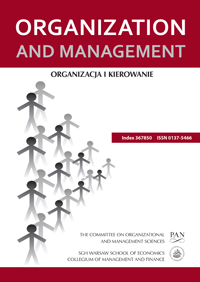Social exchange as a key factor in shaping employees' attitudes towards the organization
Main Article Content
Abstract
Social exchange has a significantly shapes employees' attitudes towards organization. The aim of the study was to verify the mechanisms of the impact of perceived support received from the organization (POS) and supervisor (PSS), gratitude and organizational loyalty on the affective commitment of employees and the desire to leave it. 443 employees of one organization took part in the research. Following research tools were used: Overview of Perceived Organizational Support, Scale of Perceived Supervisor Support, Scale of Gratitude to the Organization, Scale of Organizational Loyalty, Organizational Commitment Scale and one measure of intention to leave the organization. POS mediated fully between PSS and employees' affective commitment, and partly between PSS and the desire to leave the organization. Gratitude to the organization and care about its positive image partly mediated between POS and PSS and the employees' affective commitment. Organizational loyalty was also a partial mediator between gratitude to the organization and affective commitment. The role of social exchange in shaping employees' attitudes towards the organization has been confirmed. One identified mechanisms, both of the direct impact of POS and PSS on affective commitment, and the indirect impact of these variables, through gratitude to the organization and care about its positive image. The role of gratitude and organizational loyalty for the willingness to leave the organization was also confirmed.(original abstract)
Article Details
References
2. Blau P. [1964], Exchange and power in social life, Wiley, New York.
3. Byrne B. M. [1994], Structural equation modeling with EQS and EQS/Windows, SAGE Publications, Thousand Oaks.
4. Chirkowska-Smolak T., Wnuk M. [2018], Lojalność pracowników wobec organizacji - operacjonalizacja pojęcia oraz weryfikacja psychometryczna Skali Lojalności Wobec Organizacji - badania pilotażowe, "Organizacja i Kierowanie" 183 (4): 185-198.
5. DeConinck J. B., Johnson J. T. [2009], The effects of perceived supervisor support, perceived organizational support, and organizational justice on turnover among salespeople, "Journal of Personal Selling and Sales Management" 29 (4): 333-350.
6. Eisenberger R., Armeli S., Rexwinkel B., Lynch P. D., Rhoades L. [2001], Reciprocation of perceived organizational support, "Journal of Applied Psychology" 86 (1): 42-51.
7. Eisenberger R., Hungtington R., Hutchison S., Sowa D. [1986], Perceived organizational support, "Journal of Applied Psychology" 71 (3): 500-507.
8. Eisenberger R., Stinglhamber F., Vandenberge C., Sucharski I., Rhoades L. [2002], Perceived supervisor support: Contributions to perceived organizational support an employee retention, "Journal of Applied Psychology" 87: 556-673.
9. Fuller J., Barnett T., Hester K., Relyea C. [2003], A social identity perspective on the relationship between perceived organizational support and organizational commitment, "Journal of Social Psychology" 143 (6): 789-791.
10. Gouldner A. W. [1960], The norm of reciprocity: A preliminary statement, "American Sociological Review" 25 (2): 161-178.
11. Kline R. B. [1998], Principles and practice of structural equation modeling, Guilford Press, New York.
12. Kurtessis J. N., Eisenberger R., Ford M. T., Buffardi L. C., Stewart K. A., Adis C. S. [2015], Perceived organizational support: A meta-analytic evaluation of organizational support theory, "Journal of Management" 20 (10): 1-31.
13. Levinson H. [2001], Reciprocation: The relationship between man and organization, "Administrative Science Quarterly" 9 (4): 370-390.
14. Rhoades L., Eisenberger R. [2002], Perceived organizational support: A review of the Literature, "Journal of Applied Psychology" 87 (4): 698-714.
15. Steiger J. H. [1990], Structural model evaluation and modification: An interval estimation approach, "Multivariate Behavioral Research" 25 (2): 173-180.
16. Wnuk M. [2017a], Wdzięczność i lojalność wobec organizacji jako istotne elementy wymiany pracownik-organizacja, "Zarządzanie Zasobami Ludzkimi" 5 (118): 55-73.
17. Wnuk M. [2017b], Wdzięczność wobec organizacji jako nowy konstrukt w psychologii pracy. Właściwości psychometryczne Skali Wdzięczności wobec Organizacji, paper prepared for the 36th Congress of the Polish Psychological Association "Psychology for the health of the person and society", which was held on September 21-24, 2017 in Gdańsk.
18. Wnuk M. [2017c], Weryfikacja rzetelności oraz trafności wewnętrznej i teoretycznej polskiej wersji Przeglądu Spostrzeganego Wsparcia Organizacyjnego, "Zarządzanie Zasobami Ludzkimi" 2 (115): 91-103.
19. Wnuk M. [2017d], Właściwości psychometryczne polskiej wersji Skali Przywiązania do Organizacji, "Organizacja i Kierowanie" 3 (177): 109-125.
20. Yücel I. [2012], Examining the relationships among job satisfaction, organizational commitment, and turnover intention: An empirical study, "International Journal of Business and Management" 7: 44-58.
21. Zhanga Y., Farh J., Wang H. [2012], Organizational antecedents of employee perceived organizational support in China: A grounded investigation, "The International Journal of Human Resource Management" 23 (2): 422-446.
